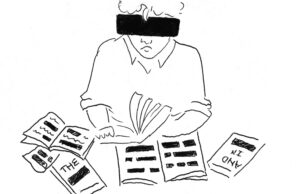The Injustice of Limited Knowledge
Schools are places where students can actively learn and develop into intellectual adults. As teachers are commonly nagging students, one way to do this is to read, and read frequently.
Banned Books Week, an event organized by the American Library Association, highlights how many schools ban books in their libraries due to controversial topics addressed in the book. This includes racial issues, homosexuality, the use of “God” or “Jesus” in vain, being sexually explicit, violence or being “too depressing,” witchcraft or unpopular religions, political bias, or being deemed “inappropriate for targeted age group.” Parental and public school or library intervention imposes the bans. Banned Books Week, taking place between Sept 27 and Oct 3 this year, stresses that people revisit these books and reconsider completely banning them from public libraries.
Some frequently challenged books are The Great Gatsby by F. Scott Fitzgerald, The Perks of Being a Wallflower by Stephen Chbosky, The Hunger Games by Suzanne Collins, and World War Z by Max Brooks. Surprisingly enough, The Hunger Games was banned because it challenges the accuracy of religion, not because of its violence. In January of this year, the Tucson Unified School District in Arizona placed a ban on books that discussed racial diversity, and its Mexican-American Student Program was judged to be “illegal.”
Without the ability to study books that are deemed controversial, students have a limited understanding of these topics that they will eventually face in the world. By banning books that deal with negativity, students cannot learn about negativity as effectively. Shockingly, most bans take place in high school libraries, rather than elementary school. By the time a student reaches a high school level, they should be able to read controversial material while being able to understand why it is controversial. It is important to allow young people to be exposed to parts of the world, even if it makes others uncomfortable. The purpose of literature is to ask questions and discuss the possible answers, even if nobody wants to discuss them. If these kinds of books are banned, open-mindedness is discouraged. Students should be taught in school to be independent and critical thinkers.
The focus of this year’s Banned Books Week is young adult novels, which are challenged “more frequently than any other type of book,” according to Judith Platt, who is part of the Banned Books National Committee. By banning books targeted towards young adults, who are usually students, some teens might lose interest in reading, or find it hard to relate to the stories that they are made to read.
Instead of banning books altogether, schools could add a restricted section of the library, and have students receive parental or teacher permission to read them. This way, if students are not prepared to read this kind of material, there is regulation on it.
Overall, censorship is something that discourages learning and makes it harder for students to learn about situations that they will encounter both in high school and later on in life. Banned Books Week 2015 is a celebration of a person’s right to read, and urges both parents and teachers to keep an open mind about subjects to which their teenager will be exposed.



1 Comment